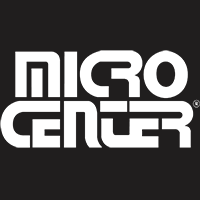Something to look forward to: Intel has officially announced 11th-gen Core "Rocket Lake" desktop processors today, and many of these new parts are coming in at more affordable price points than AMD’s equivalent Ryzen 5000 CPUs. Is it time to get excited about new Intel CPUs?
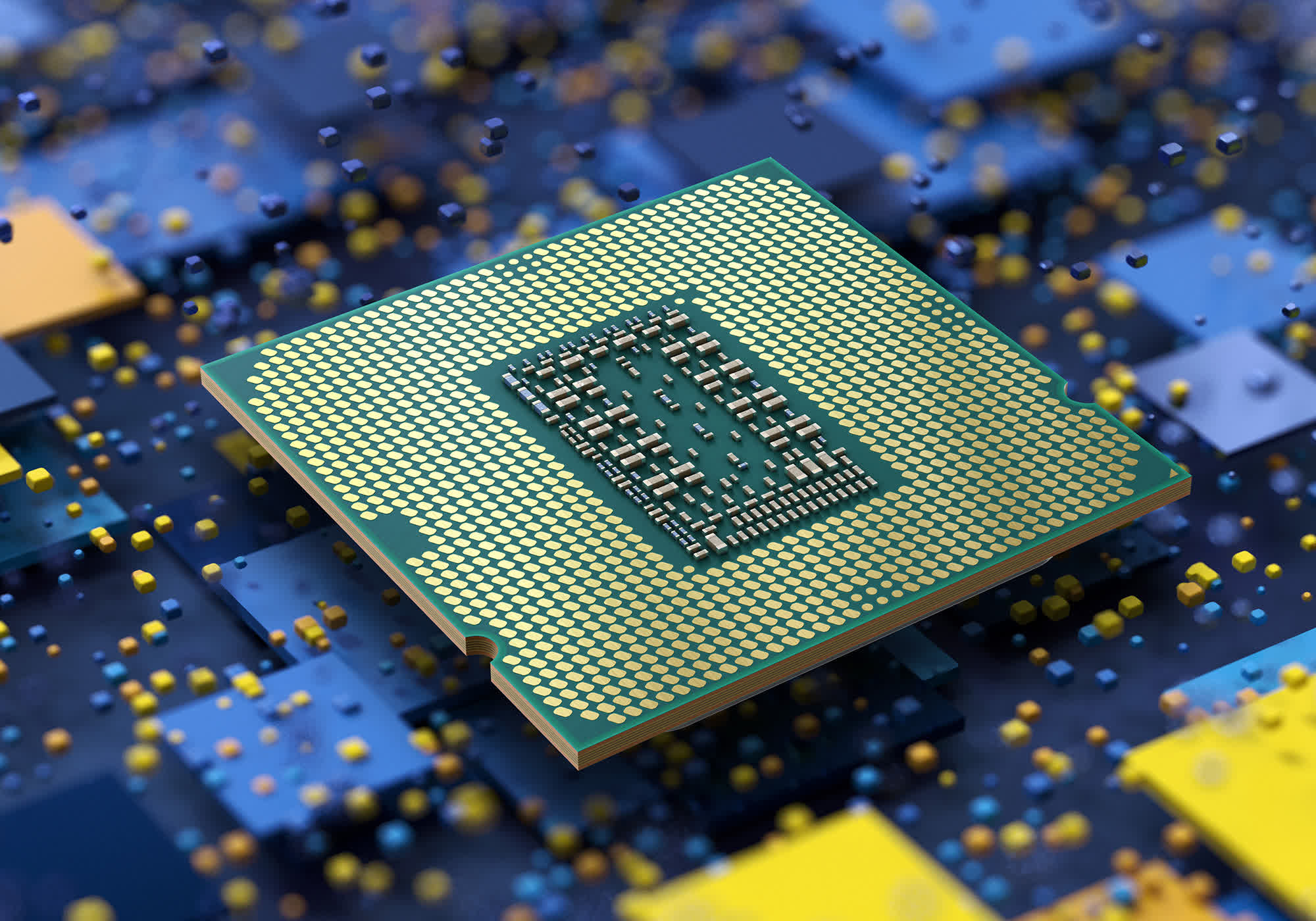
Today we are putting the final pieces of the puzzle together on Intel’s 11th-gen desktop CPU series ahead of reviews later this month. In the lead up to this launch, Intel had already given up quite a bit of information on Rocket Lake, plus the crazy stream of leaks we've received over the last few months that culminated in actual reviews of retail Core i7-11700K processors ahead of the actual announcement.
We know the design is still built on their 14nm process, however it features a new core architecture codenamed Cyprus Cove. This is Intel’s Ice Lake design originally destined for 10nm, backported to 14nm, bringing with it up to a 19% IPC improvement compared to Skylake and its derivatives over the last 5 years. However it’s not the latest core design from Intel, with Tiger Lake – actually on 10nm – using a generation newer architecture in mobile devices.
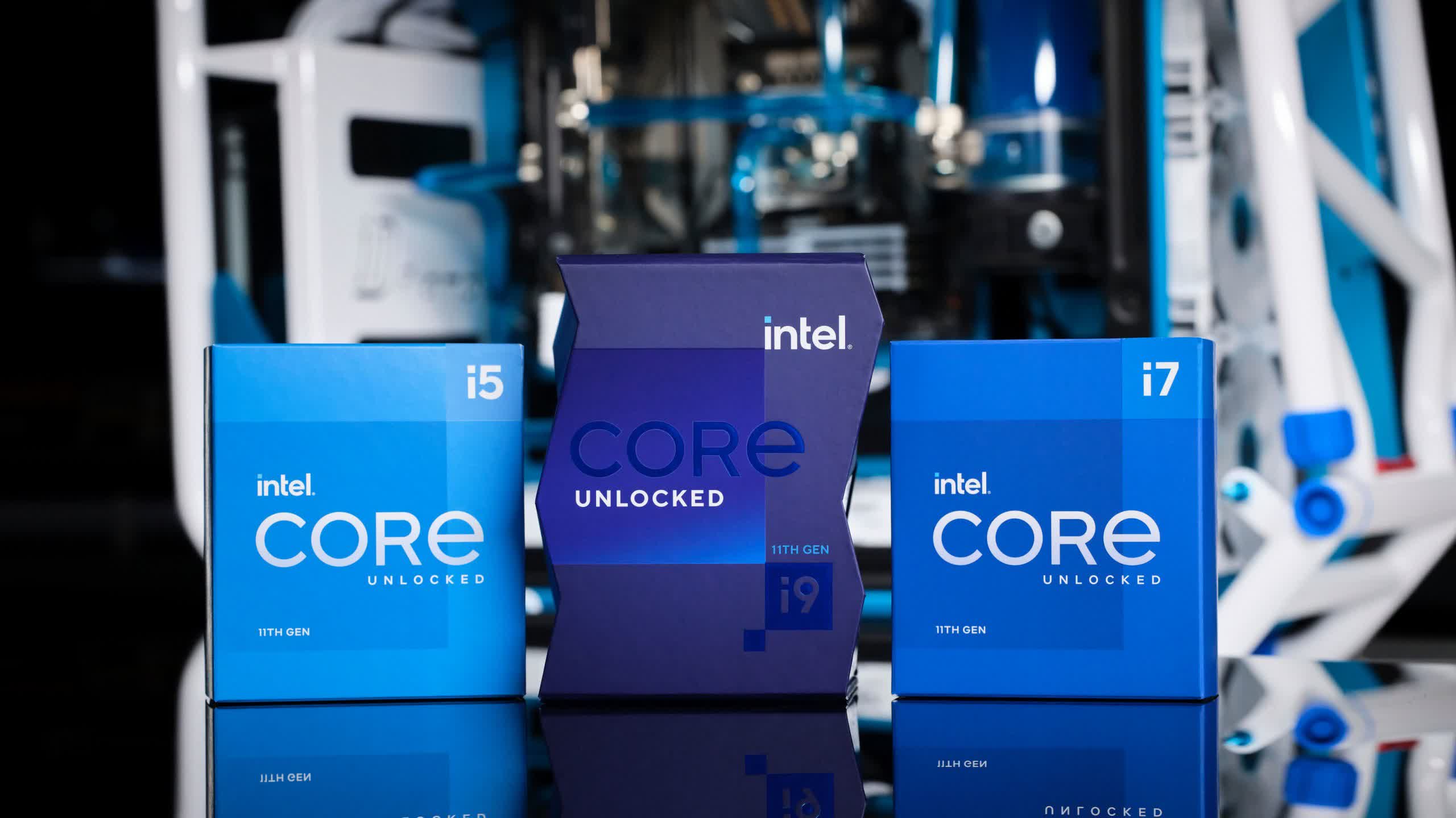
Intel had previously told us about the Core i9-11900K and the inclusion of a maximum of eight CPU cores. There’s a new Xe integrated GPU inside, new AI features, and new platform support through Intel’s 500 series motherboards. This is all stuff we've reported on already so let’s cut to the chase with the full list of processors and pricing.
While there are a lot of individual processors listed in this table – far too many in my opinion – the basics of Rocket Lake are split up into three series: Core i9, Core i7 and Core i5, as usual. However unlike prior generations, there are no Rocket Lake Core i3 models, Intel is instead launching refreshed 10th-gen parts at the lower end which we’ll talk about soon.
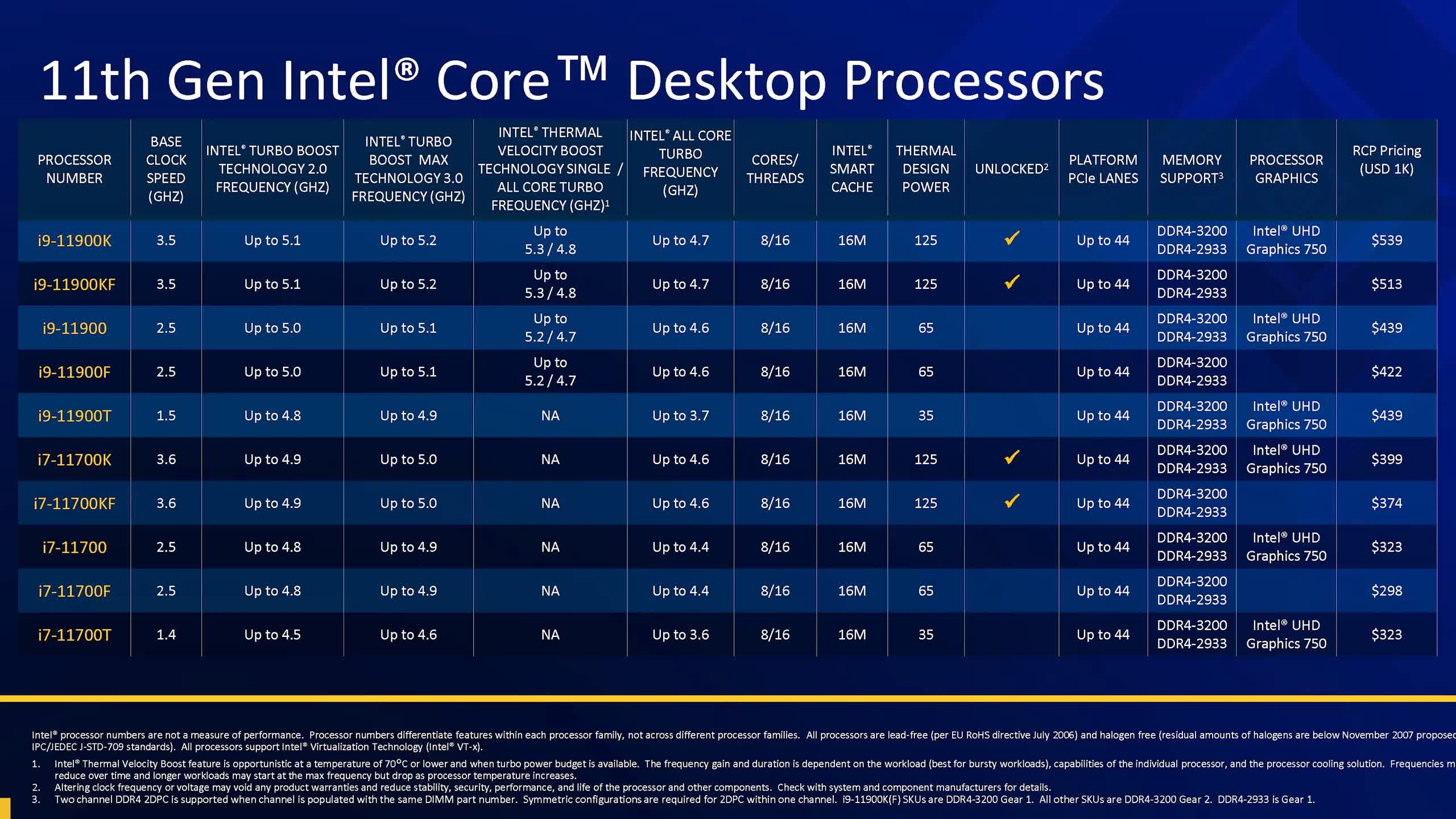
The Core i9 and Core i7 parts are very similar: all pack 8 CPU cores and 16 threads with 16MB of L3 cache. The K models are unlocked SKUs that support overclocking, the F models do not feature integrated graphics, and the T models are low power variants with a 35W TDP. The models that do feature an iGPU use new Xe graphics, although this is being branded as UHD Graphics 750 for some reason. You’ll find 32 execution units here with up to a 50% performance boost compared to previous generations according to Intel.
With the Core i9 and Core i7 parts using the same basic layout, what separates them? The basic answer is frequency. The Core i7-11700K and KF are clocked up to 5 GHz on a single core, and up to 4.6 GHz all-core. The Core i9-11900K and KF push the single-core Turbo up to 5.3 GHz, but that’s with Thermal Velocity Boost, a feature that increases clock speeds when operating temperatures are low, and this feature isn’t enabled on Core i7. Without TVB, the 11900K still tops out at 5.2 GHz, an increase on the 11700K, however the all-core frequency is just 100 MHz higher at 4.7 GHz.
The other difference between the Core i9 and Core i7 parts is hidden in the footnotes of the SKU list. The 11900K and KF both operate by default using “DDR4-3200 Gear 1”, while all the other SKUs, including the Core i7 range, default to DDR4-3200 Gear 2. These Gears refer to the frequency ratio between the memory controller and memory itself, which has historically been 1:1 on Intel parts. Gear 1 is the usual 1:1 ratio, while Gear 2 is a 2:1 ratio, halving the memory controller frequency. This means that while the unlocked Core i9 processors run at a standard 1:1 ratio, the locked Core i9 parts and the Core i7 line all use a slower 2:1 configuration by default.
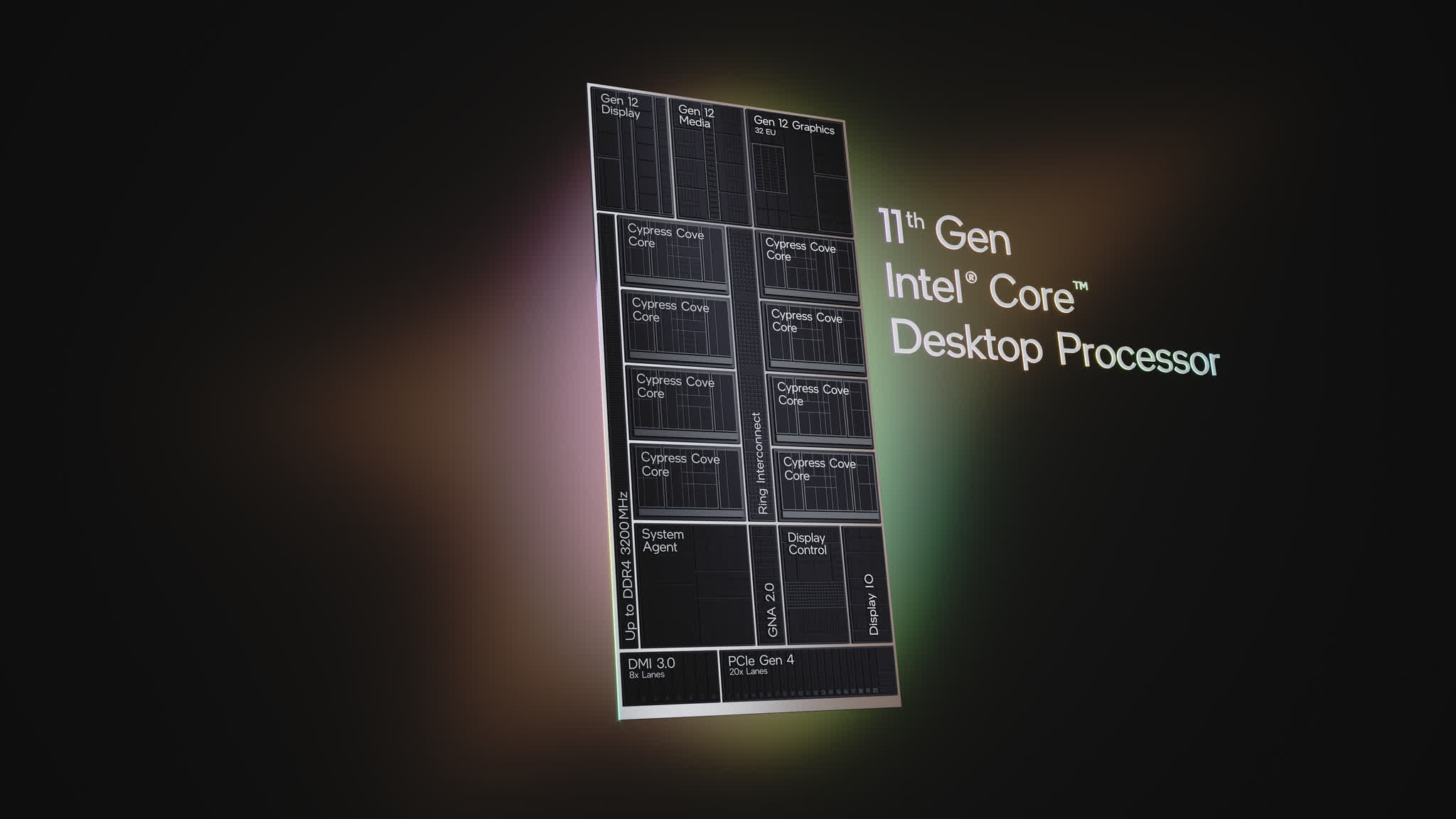
This introduces some further differentiation between the Core i7 and i9 parts as the i7 models will have worse memory performance. You may be familiar with these ratios if you’re an AMD Ryzen user given that the recommendation for those parts as well is to run in a 1:1 ratio, rather than pushing memory frequencies higher and falling back to 2:1. So it will be interesting to see how this affects Intel processors.
With that said, motherboard manufacturers are likely to ignore this recommendation and run all Rocket Lake processors in Gear 1 (so a 1:1 ratio) out of the box. AnandTech confirmed this was the behavior they saw when testing their retail Core i7-11700K processor: it should run at 2:1 going on Intel’s slides, but the actual default seen in the motherboard was 1:1.
Let’s talk pricing for these parts before looking at the Core i5 line. The most interesting thing to note is the pricing of the unlocked Core i7 models: $374 for the KF and $399 for the K SKU using Intel’s standard tray pricing model. It should be noted that tray pricing for bulk units is not the same as an MSRP, and typically at launch Intel’s parts are sold at 10% above this tray price or thereabouts, before falling to or below the listed price in the months after.
In any case, what we're looking at is an 8 core, 16 thread Rocket Lake CPU priced around $400, which is undercutting AMD’s 8-core Ryzen 7 5800X that retails for $450. There may be some other platform costs to consider, like the difference in motherboard pricing, however at first glance this is an aggressive price point from Intel that should compete strongly with AMD’s offering. If these prices are accurate, then Intel could be offering better performance per dollar in the eight core space given that early 11700K reviews show it performing close to the level of a 5800X.
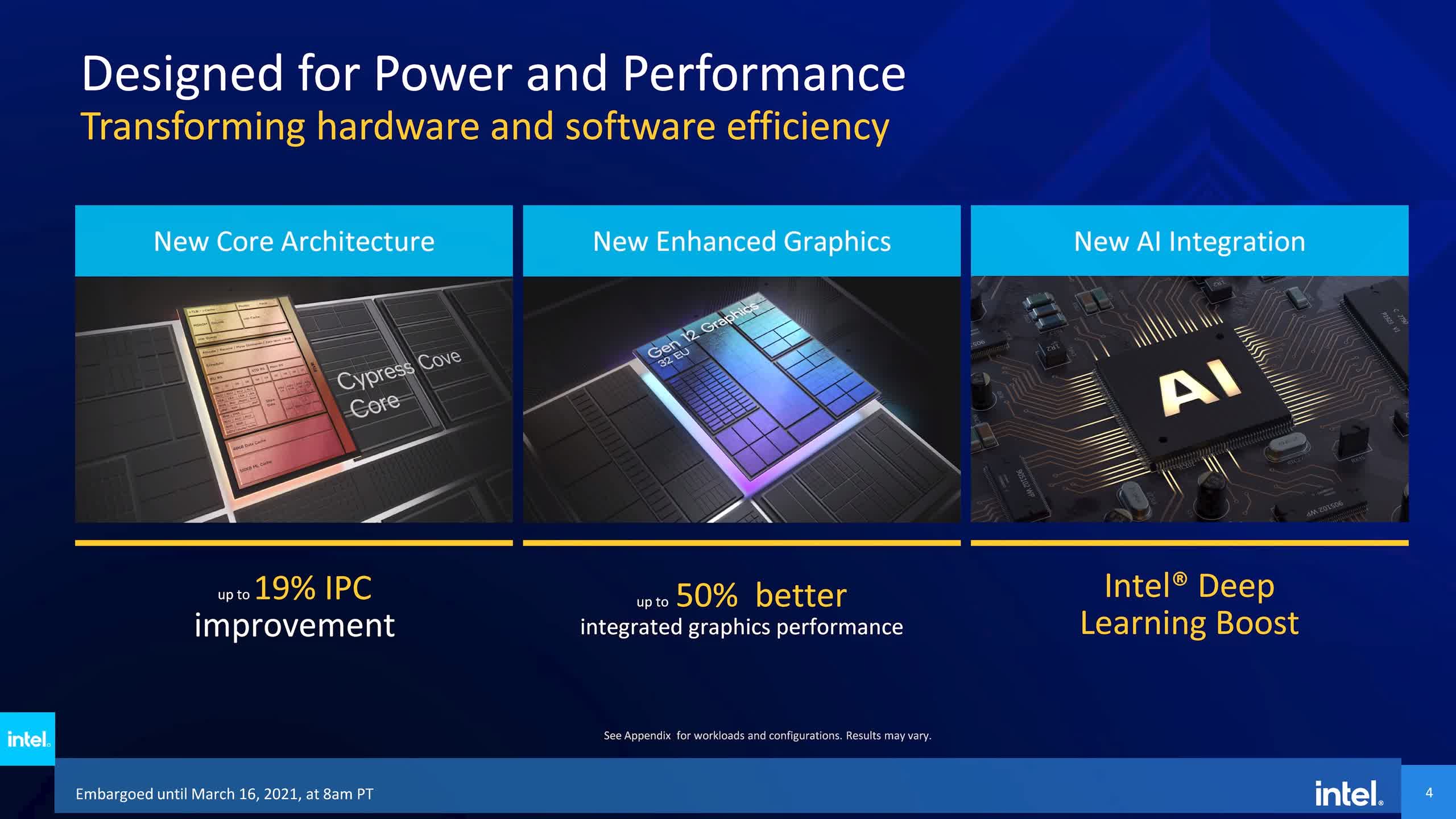
SKU for SKU, these Core i7 parts are slightly more expensive than last-gen offerings: about $25 more than the Core i7-10700K and KF going on Intel’s tray price. However these new parts are supposed to be faster, and they’re still cheaper than AMD’s line right now.
What doesn’t make as much sense is the price of unlocked Core i9 models. $539 for the 11900K and $513 for the 11900KF represents a $140 premium over the Core i7 models for what amounts to a very small frequency bump. The 11900K will end up competing with AMD’s Ryzen 7 5900X at around $550, although AMD is offering 12 cores versus Intel's 8. Moreover, the 11900K is likely to present a performance regression in core-heavy applications compared to the 10900K, given the step back from 10 cores to 8 cores.
Intel appears to be interested in capturing die-hard enthusiasts and fans with that sort of pricing model, which is in contrast to the 10th-gen Core i9 series that did offer decent performance gains over the Core i7s in some workloads. The clear standout in the 11th-gen series is the Core i7 part.
With the Core i5 line, Intel is also looking to be very competitive in the mid-range.
All CPUs are six cores with 12 threads, 12MB of L3 cache and for the parts with an iGPU, the same UHD Graphics 750. The K parts are unlocked, while clock speeds also differ between the tiers. The top-end parts do up to 4.6 GHz all-core and 4.9 GHz single core, while a lower-end SKU like the Core i5-11400F does 4.2 GHZ all-core and 4.4 GHz single-core.
Pricing continues to undercut AMD. The 11600KF should end up around $260 at retail from a $237 tray price, putting it below AMD’s Ryzen 5 5600X at $300 – and compared to 10th-gen Core i5s there is no price increase. But the really compelling products appear to be the lower-tier parts, especially the Core i5-11400F at a $157 tray price, likely around $170-180 at retail. AMD doesn’t have anything compelling in this price tier right now, with the Ryzen 5 3600 selling for $200 and even the Ryzen 5 2600 going for $190.
With the 11400F using Intel’s new Rocket Lake architecture which should deliver a healthy performance bump, we should have increased competition in the $150 to $200 CPU market and it will make it harder for AMD to justify selling a three-year-old CPU at such a high price. We’ve already been recommending Intel’s Core i5 CPUs in this segment for months and if there’s no adjustment on AMD’s side, that’s set to continue with Intel launching faster models.
As for Core i3 and Pentium Gold processors, Intel aren’t releasing 11th-gen options just yet, instead refreshing their 10th-gen Comet Lake offerings. These are basic frequency bumps, so something like the Core i3-10100 is now clocked 100 MHz higher and becomes the Core i3-10105 at the same price.
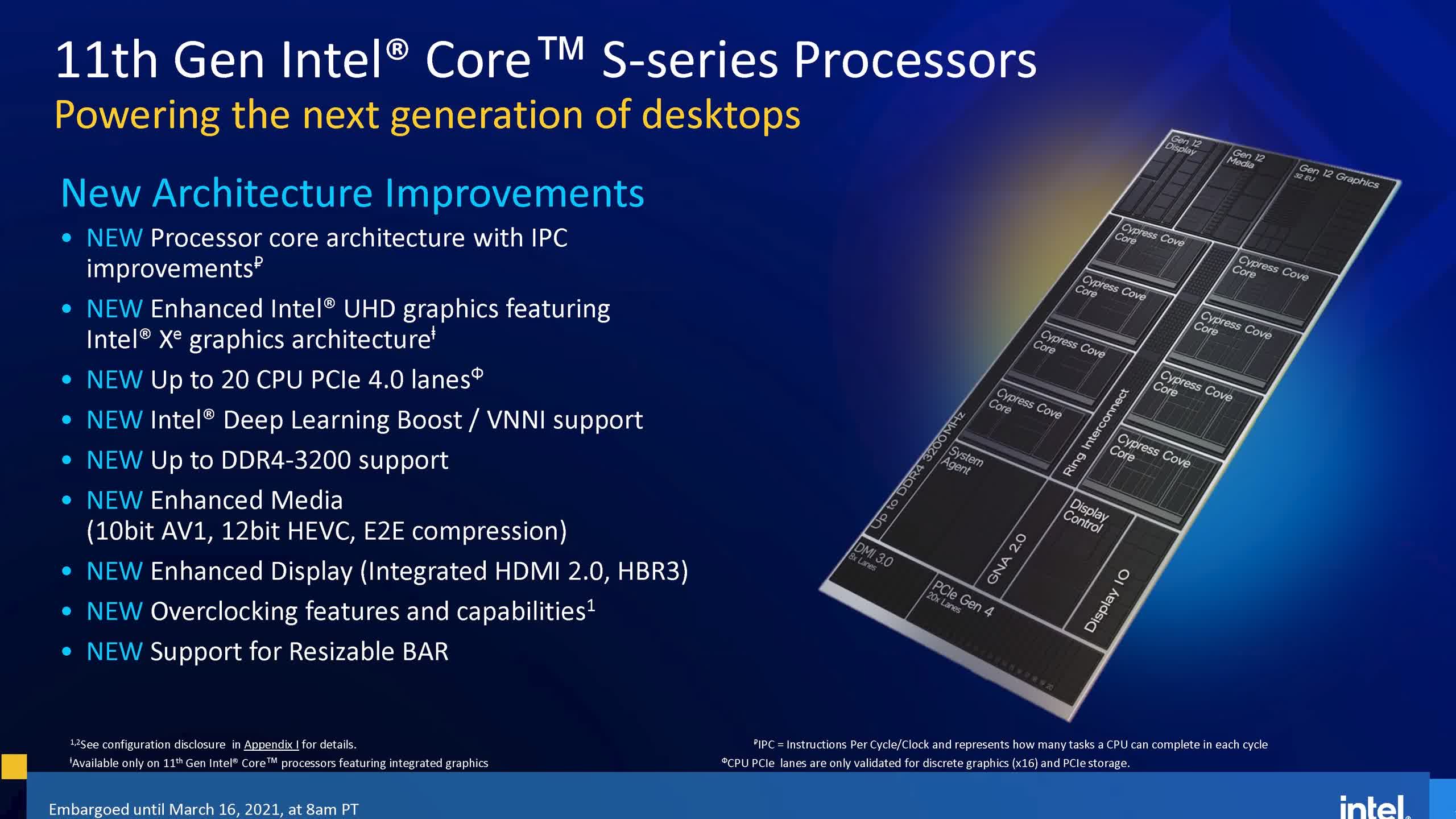
Intel has been talking about Rocket Lake’s CPU features for a while, so we’ll just breeze through this in case you missed it. Aside from the new Core architecture, another major addition is the bump from 16 PCIe 3.0 to 20 PCIe 4.0 lanes from the CPU. This allows you to attach both a x16 GPU and a x4 SSD directly to the CPU for best performance, in contrast to previous designs where M.2 SSDs had to go through the chipset. Intel are also finally coming to the table with PCIe 4.0, bringing feature parity with AMD.
We also get a better media encode-decode engine thanks to the upgrade to Gen 12 graphics and all that comes with it, although this functionality won’t be available with F series SKUs.
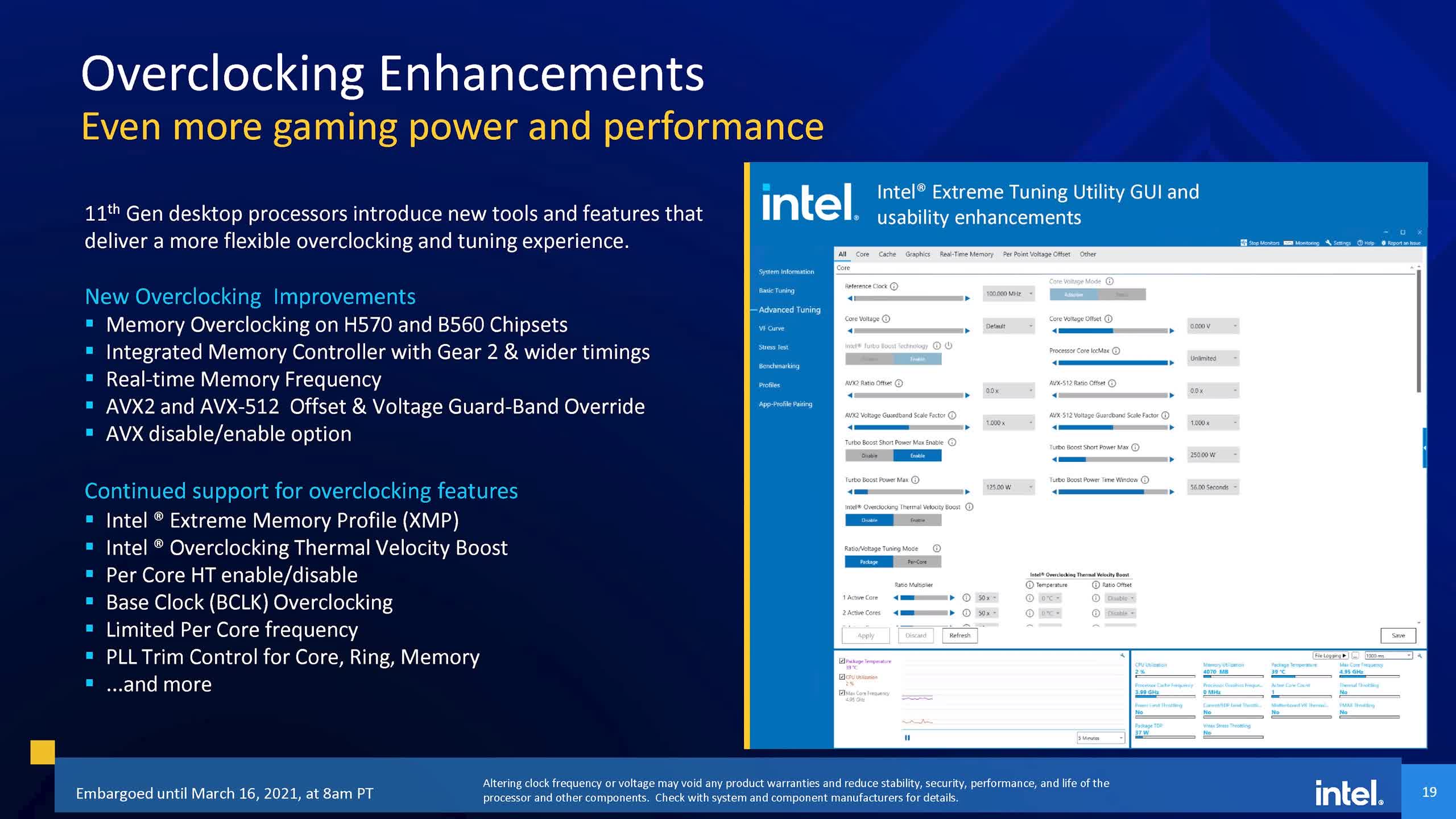
11th-gen processors support a wide range of improved overclocking features. One of the most interesting ones is real-time memory frequency overclocking, which will allow tweaking memory OCs in Windows through Intel’s Extreme Tuning Utility without any restarts. Previously you’d have to do most memory overclocking in the BIOS. Intel also provides a wider range of AVX offsets and controls, which is especially useful given these new processors support AVX-512 and overclockers will likely need to set a large offset to get a stable OC.
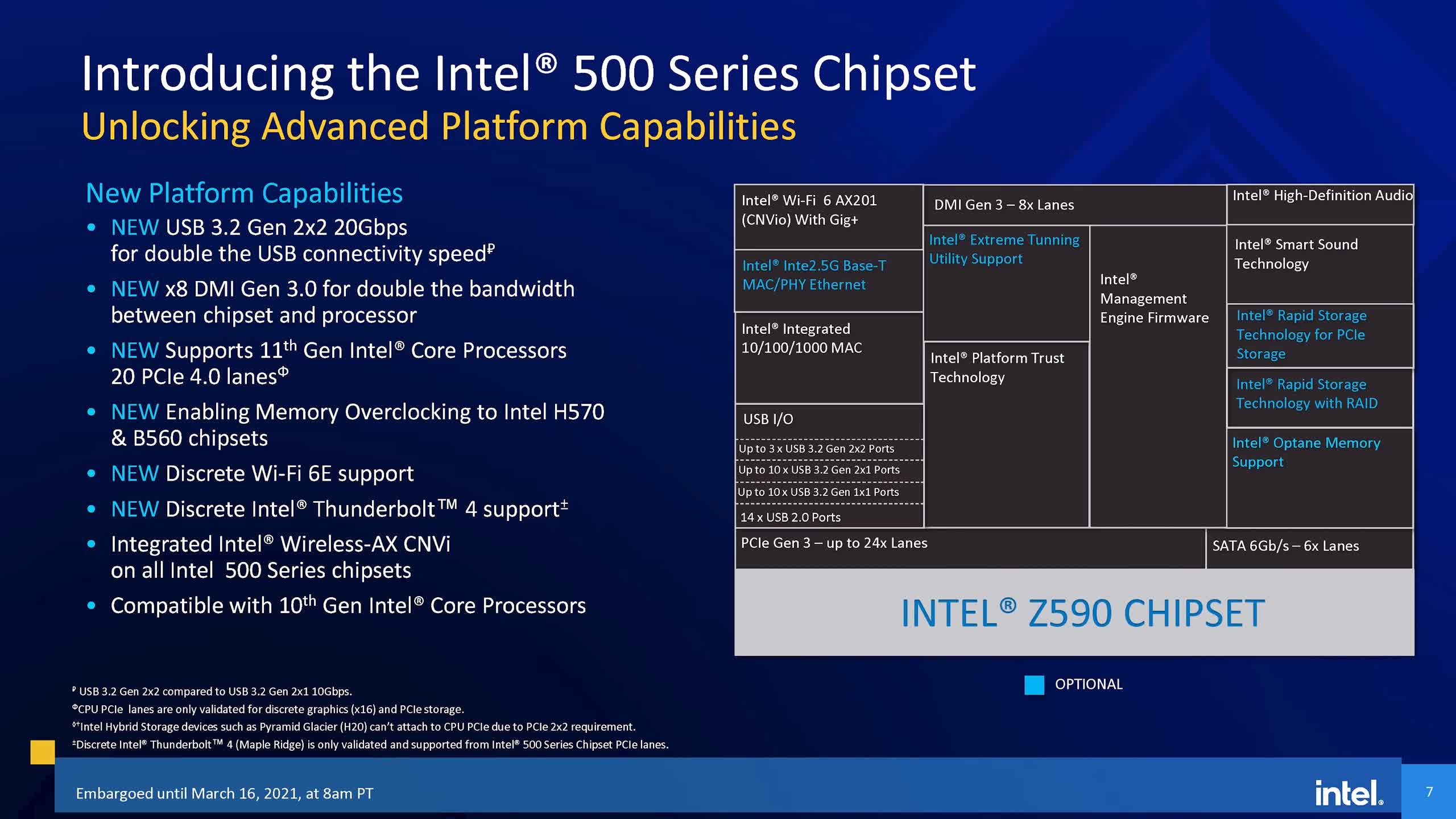
New Intel 500 series motherboards are launching alongside Rocket Lake, too. The main features are memory overclocking support on H570 and B560 motherboards, a new x8 DMI for double the bandwidth between the CPU and chipset, and full support for PCIe 4.0 across the line-up. These boards are backwards compatible with 10th-gen processors as well.
However you don’t need a 500 series board to use an 11th-gen processor, as Rocket Lake is compatible with some 400 series boards, namely Z490, H470 and Q470. Unfortunately, B460 and H410 boards do not support Rocket Lake as they use an incompatible chipset. Intel tells us that depending on the motherboard, you may get PCIe 4.0 support and the full 20 CPU lanes of PCIe on 400 series boards with Rocket Lake CPUs, but this will come down to whether the motherboard vendor enables it and their board layout.
We’ll wrap up with a brief look at Intel’s performance slides, which are not very useful as they are limited in the information shown – and we already have actual reviews of the Core i7-11700K on the internet if you want to see an independent analysis. Intel shows just four games in their gaming comparisons, all benchmarked with a GeForce RTX 3080.
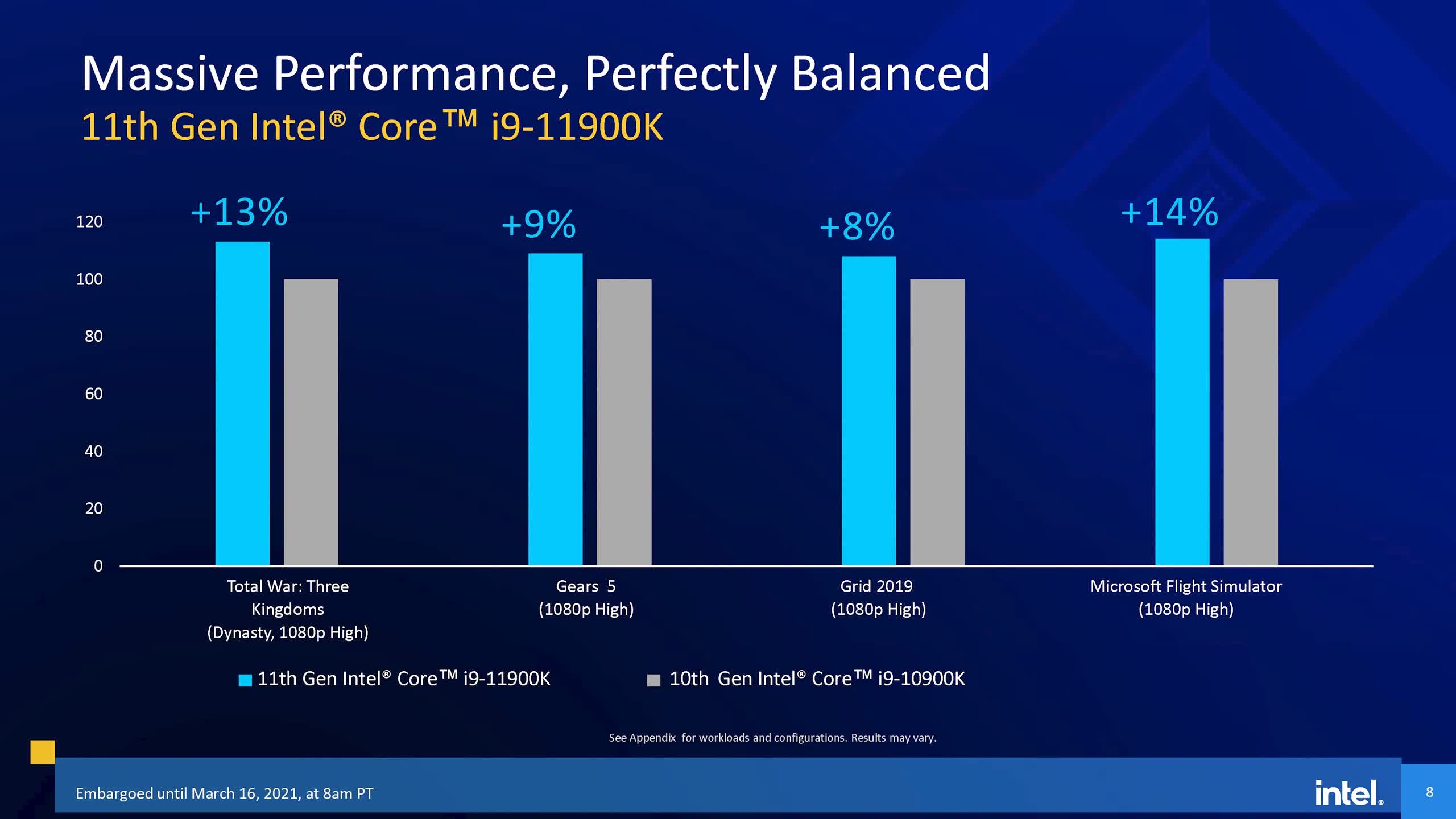
Intel is showing “massive performance,” which to them means 8 to 14% improvement versus the Core i9-10900K in these four games. Up against the Ryzen 9 5900X, Intel is also winning in their benchmarks, with a 3 to 11% lead. Intel also expects the Core i5-11600K to be faster than the Core i5-10600K by 7 to 16% in the same four games they have showcased.
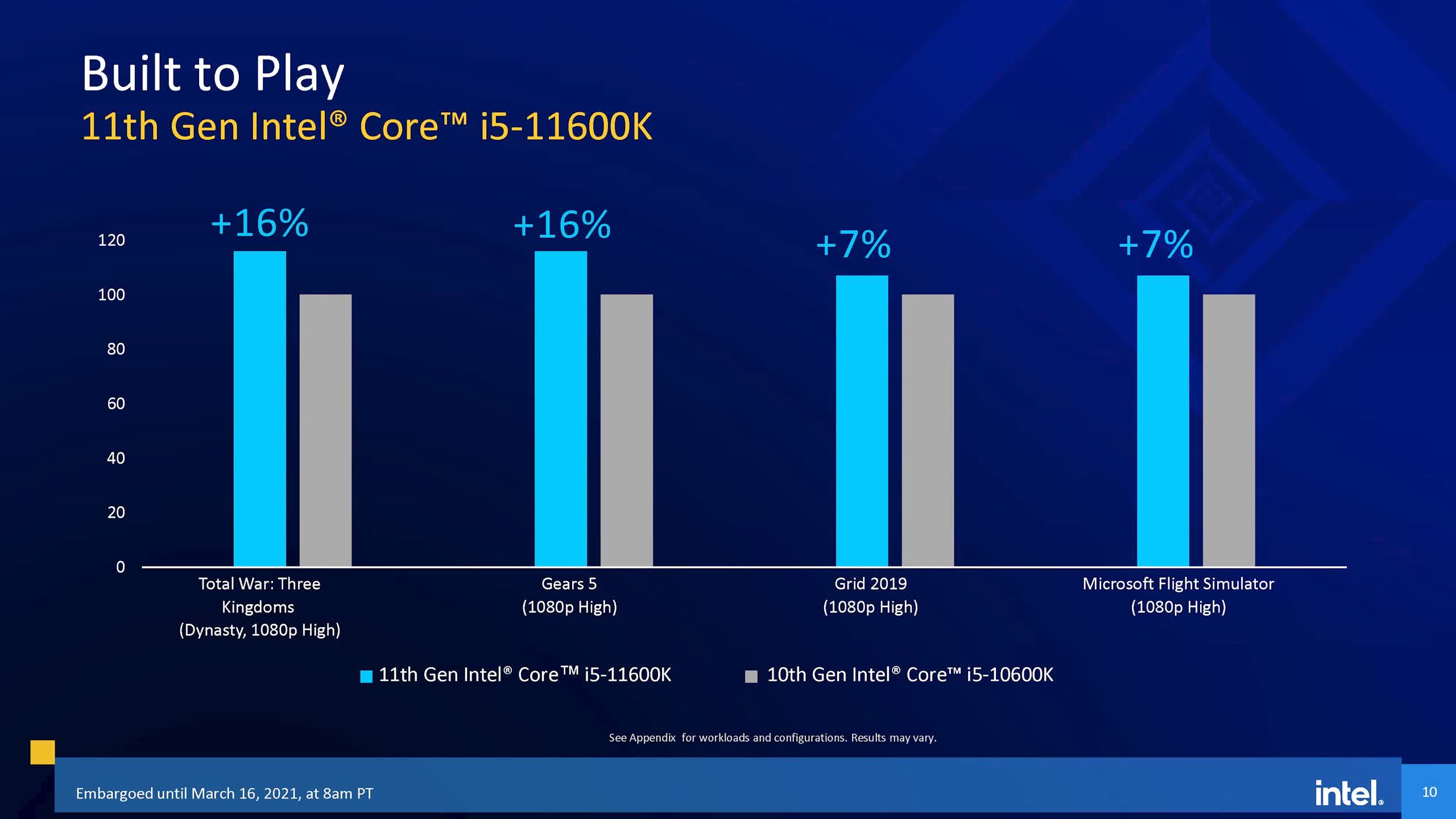
Intel’s other benchmarks surround productivity performance, and like previous presentations a lot of the focus is on applications coded to take specific advantage of Intel’s accelerators. It’s unclear whether, for example, the video creation and MLPerf gains shown here versus the 5900X would also apply to the Core i9-11900KF, which does not include the integrated GPU.
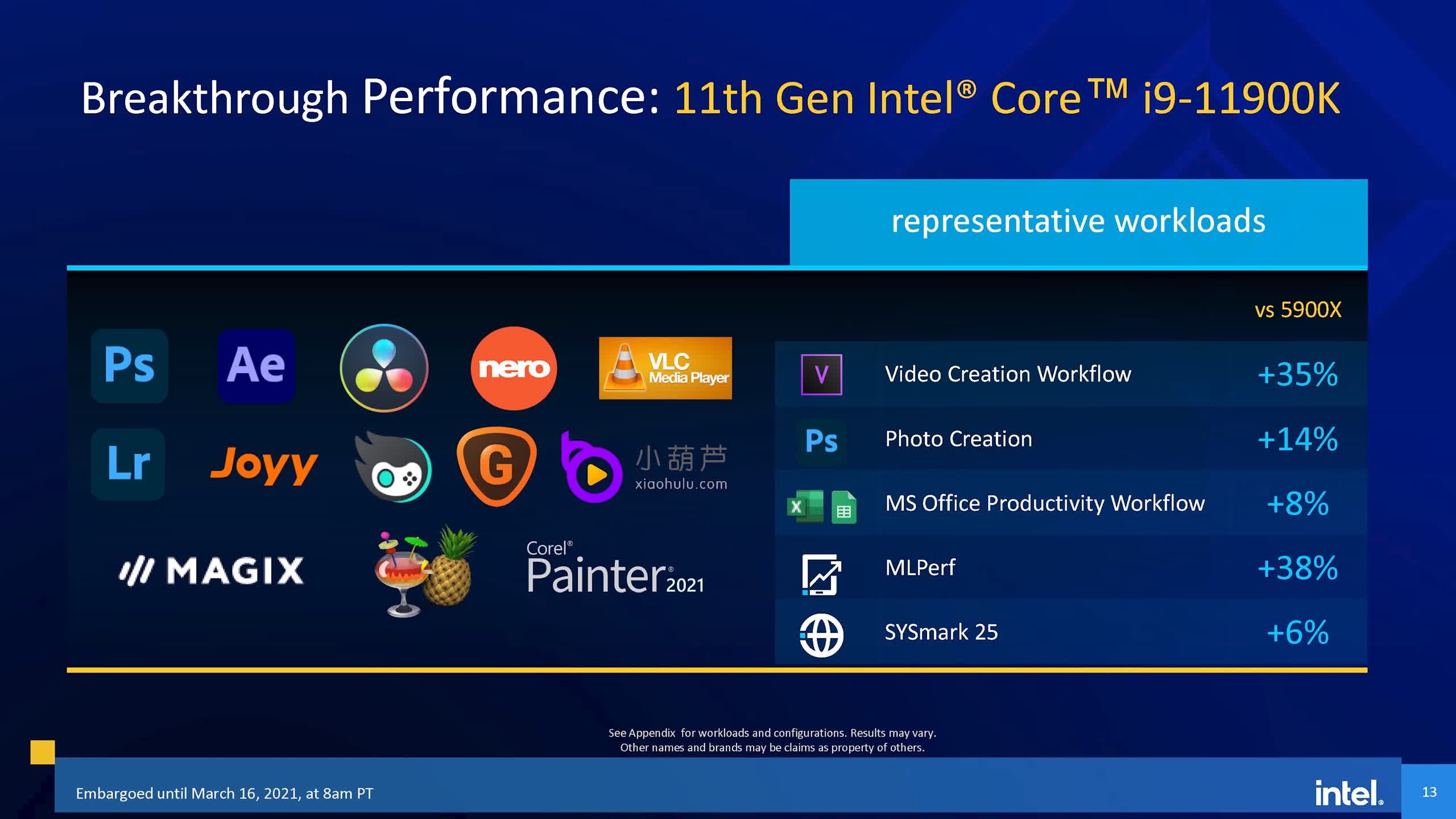
The key piece of information of today's announcement was pricing, which gives context to the performance and specifications we already knew about – especially performance for the 11700K. The new Rocket Lake CPUs are expected to go on sale on March 30th, which is when reviews will also go live and if all goes well availability shouldn't be a problem for Intel parts as we discussed in our CPU and GPU availability and pricing update earlier this week.
https://www.techspot.com/news/88934-intel-11th-gen-rocket-lake-cpus-now-official.html

